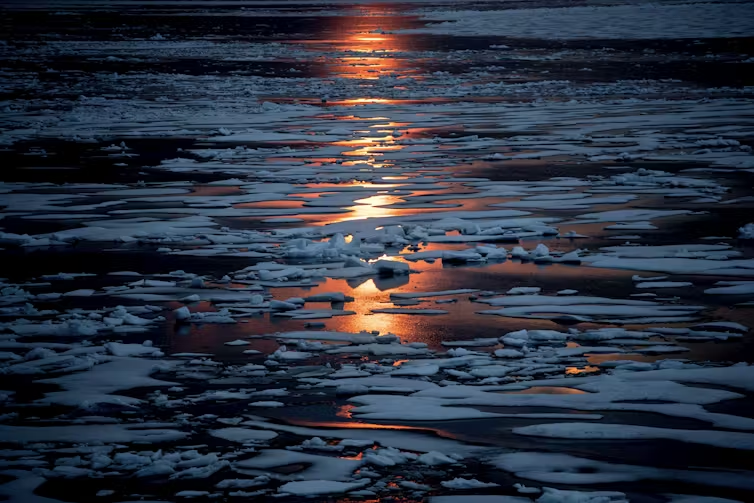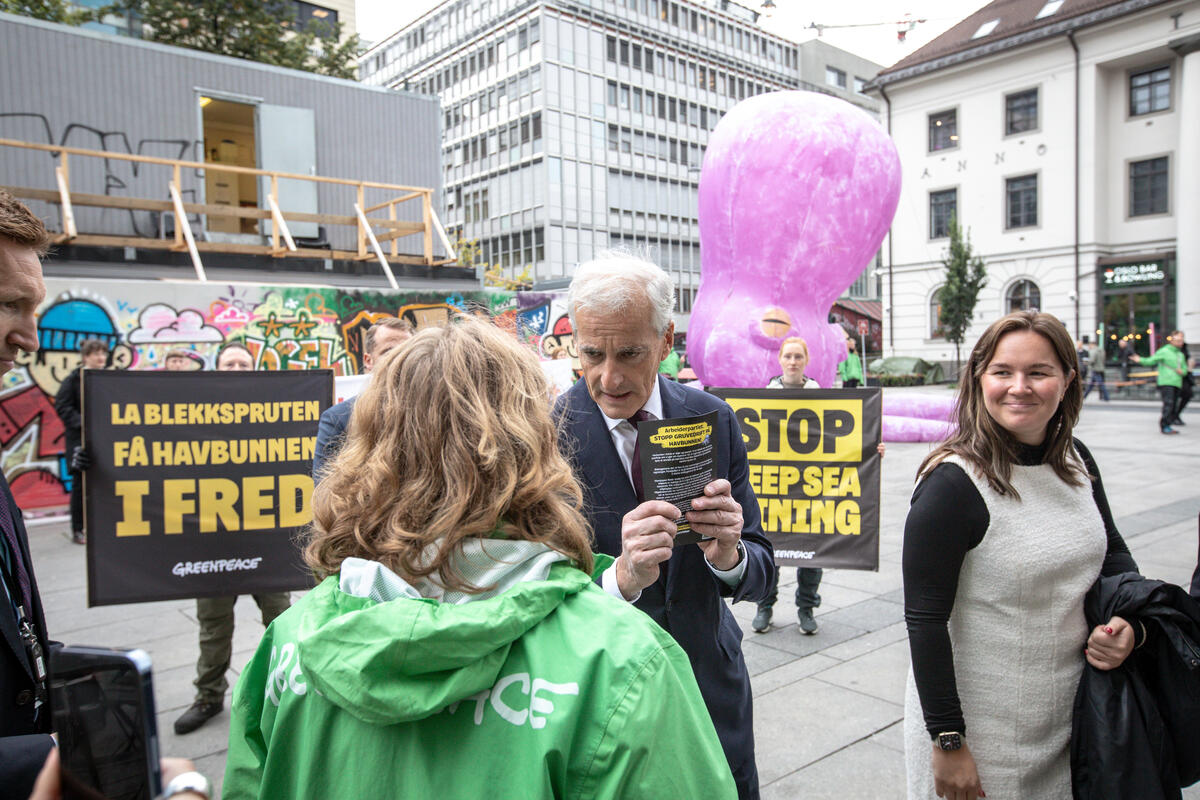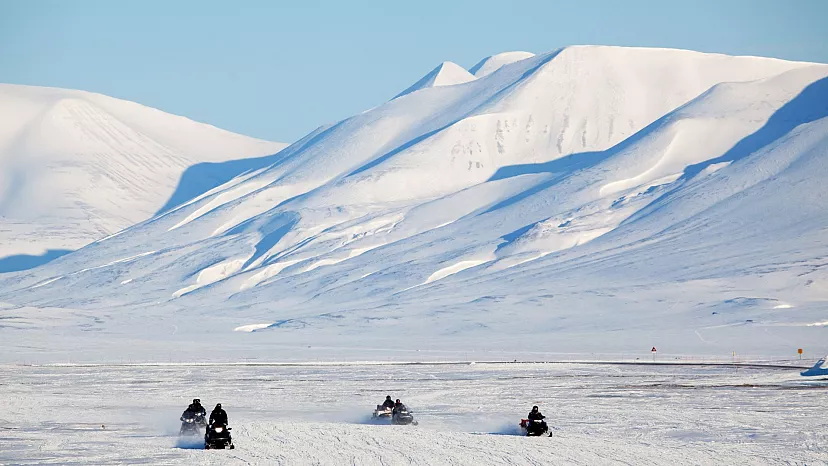Climate change is making it almost impossible to decide how much, where and what to sustainably fish as the fate of future fisheries is becoming increasingly uncertain. This is leading to a slow process or inaction in adapting fisheries and their management to climate change.
This could even further exacerbate the increasing trend of overfished global fish stocks. As the Arctic Ocean loses sea ice due to climate change, fisheries access is increasing, and large-scale exploitation is on the horizon.
These changes threaten the fragile Arctic Ocean ecosystem that harbours polar bears, beluga whales, narwhals and a range of fish species, such as Arctic char and Greenland halibut.
All of these animals are culturally and socially important for coastal Indigenous peoples.
Commercial fisheries moratorium
In 2021, 10 countries agreed upon a moratorium on commercial fisheries in the central Arctic Ocean, the international high seas of the Arctic.
It provides a 16-year runway for improved scientific understanding of an ecosystem that is emerging below the retreating sea ice cover. Any future fishing activity or international management agreements are to be based on scientific information and Indigenous knowledge.
This landmark agreement provides a chance to do things differently: to establish a proactive and just fisheries management system, rather than a reactive one, that can lead to unsustainable and unregulated fishing.
While in April 2024, the nations that signed the Agreement reached a consensus on a science implementation plan. This plan includes mapping critical ecosystems, pinpointing vulnerable and sensitive habitats, and gathering Indigenous knowledge, all as mandated by the Agreement. However, previously, several nations have also made it clear that their participation is intended to secure access to future fisheries and that they consider the moratorium temporary.
Therefore, the window may be closing on this agreement. That’s why now is the time to establish a proactive, precautionary and climate-informed management framework that considers the unique and fragile Arctic ecosystem — before any explorative fishery and ideally before large-scale, unregulated fishing activities.
Such a management framework is needed despite the large uncertainty about the future Arctic Ocean. Inaction is no option.
Supporting fisheries governance
I am part of a collaboration of academic scientists, the Environmental Defence Fund and the European Polar Board that proposes integrating uncertainty to support future fisheries governance in a changing Arctic Ocean.
As a first step, we used the marine ecosystem model ensemble developed by the Fisheries and Marine Ecosystem Model Intercomparison Project to quantify uncertainty about future Arctic fisheries. This included assessing how and why the ecosystem models differ in their projections of future fish abundance in the Arctic Ocean — most models showed abundance increases, some showed decreasing fish abundance.
Focusing on the entire Arctic Ocean, we’re hoping to expand the understanding of near future climate change impacts on Arctic marine ecosystems. To date, most studies have focused on a small subset of the region, such as the Barents Sea and Bering Sea. We also highlight near-term (2030-2049) decreases in fish abundance in some Arctic waters, a result rarely discussed because end-century (2090-2099) changes are much more commonly published.
We show that future changes in fish abundance, water temperature and sea ice extent varies among the different Arctic regions. The largest change in fish abundance is found in the central Arctic Ocean.
Often, the models disagree in the direction (increase vs. decrease) of fish abundance change, illustrating the substantive uncertainty about the Arctic’s future. Because the models are uncertain, they are unlikely to effectively inform fisheries management in the Arctic now or in the near future.
Model refinement takes time and resources. However, these models can already be used as a source for plausible, policy-relevant risk scenarios.

Risk assessment
Communicating uncertainty as risk, which the Intergovernmental Panel on Climate Change (IPCC) defines as “the potential for adverse consequences for human or ecological systems, can be more tangible and actionable for policy and decision-making purposes.
This way, risks that are unacceptable can be identified and a course of action mapped to mitigate them.
One tool is structured scenario planning. It enables diverse participants, including Indigenous organizations, governmental and academic scientists, fisheries managers and members of the fishing industry, to envision alternative futures to evaluate options for preparation and adaptation.
In this context, participants could provide risk boundaries pertaining to detrimental environmental changes, such as ocean acidification, that could increase the vulnerability of a certain fish stock or marine mammal population to exploitation.
Sustainable management
Despite the large unknowns about the future of Arctic fisheries, action is needed now for a precautionary and sustainable fisheries management.
Methods and skills must be developed by key stakeholders to operate within uncertainty, to move forward with what is known and to quickly change course based on what is learned.
By doing so, scientists and policymakers can together seize the opportunity of the moratorium to combat inaction due to uncertainty about future Arctic fisheries and work towards a sustainable and just future for the Arctic.




This is a vital discussion! Accepting uncertainty in sustainable fisheries can lead to more innovative and flexible management approaches. It’s encouraging to see this topic gaining attention as we face the challenges of a rapidly changing Arctic.
Great points made here! Acknowledging the unpredictability of the Arctic ecosystem is essential for sustainable fisheries. It’s important for policymakers and stakeholders to incorporate this understanding into their decision-making processes.
Thank you for highlighting this important issue. Accepting uncertainty is a key step towards sustainable fisheries management in the Arctic. It encourages a proactive approach rather than a reactive one, which is crucial in these times of change.
In the face of rapid changes in the Arctic, accepting uncertainty is not just a challenge but an opportunity for innovation in sustainable fisheries. By fostering a mindset of adaptability, we can better navigate the complexities of this unique ecosystem and safeguard our livelihoods for the future.
The Arctic’s dynamic environment highlights the importance of accepting uncertainty in sustainable fisheries. By integrating this understanding into our career practices, we can enhance collaboration and innovation, ensuring that our fisheries remain viable for generations to come.
Acceptance of uncertainty is a profound act of faith in the resilience of our ecosystems. As we strive for sustainable fisheries in the Arctic, let us remain open to the lessons that change brings, guiding us toward a more balanced existence.
Accepting uncertainty isn’t just a strategy; it’s essential for sustainable fisheries in the Arctic’s evolving landscape.